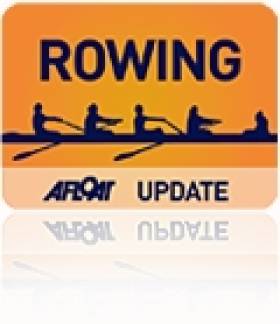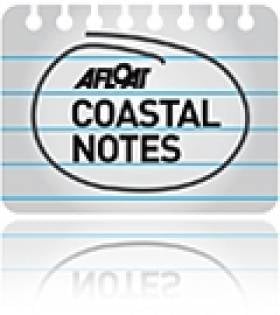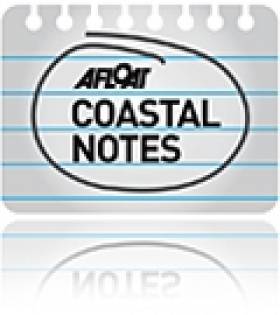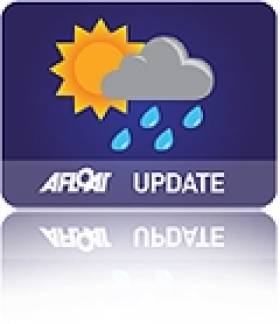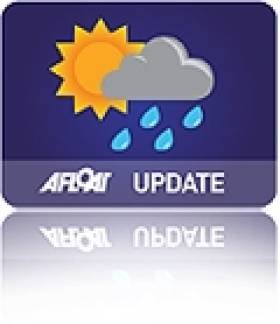Displaying items by tag: Weather
Head of the Shannon Cancelled Because of Rising Water Levels
#Rowing: The Head of the Shannon, fixed for Carrick-on-Shannon this Saturday, December 5th, has been cancelled. The organisers say that the rising water levels on the river, combined with the forecast for the weekend, has left them with no alternative. The Muckross Head is also scheduled for Saturday, at the National Rowing Centre in Cork.
Weather Warnings Upgraded As Storm Clodagh Arrives
#Weather - Met Éireann has issued a Status Orange wind warning for all parts of the country as weather conditions will see southwesterly winds veering westerly will reach means speeds of 60 to 80 kmh with gusts of up to 130kmh.
The national warning is in place till 3pm this afternoon (Sunday 29 November), though there is no current limit on the marine Status Orange of west to south west gales, later west to northwest, reaching strong gale or storm force during the day.
According to the UK's Met Office, this third storm system of the winter season has been officially named Storm Clodagh by Met Éireann as part of the new naming regime.
The storm system is bringing with it heavy showers particularly in western counties, as previously reported on Afloat.ie, and has already led to the postponement of today's planned RNLI Reindeer Run at Fota House and Gardens in Cork Harbour till a later date to be confirmed.
Also cancelled today were Royal Cork's Winter Yacht Racing League and on Dublin Bay, DBSC's Turkey Shoot series suffered another cancellation. The six race series has had four cancellations so far and has been extended until December to 20th to compensate.
Cliffs Of Moher Evacuated Over High Winds Danger
#Weather - The Cliffs of Moher were closed to visitors yesterday afternoon (Friday 27 November) over "dangerously high winds", as BreakingNews.ie reports.
Gusts of up to 150kmh were predicted to sweep across the 700m coastal cliffs that are a popular attraction for tourists in the Burren region.
Staff at the visitor centre take extreme weather conditions very seriously, particularly after a number of people were swept off their feet by 120kmh winds that closed the beauty spot twice in a single week in February 2013.
Met Éireann maintains a Status Yellow warning for all Irish coasts and the Irish Sea today (Saturday 28 November) with southwesterly gales gusting up to 100kmh and as much as 50mm of rainfall in counties along the Wild Atlantic Way.
#Weather - Following last week's weather warning ahead of Storm Abigail, which brought gusts of up to 120km/h in north-west counties, Met Éireann has issued another Status Orange alert for all coastal waters.
Southwest gales to strong gales will develop today (Tuesday 17 November) on Irish coastal waters from Belfast Lough to Roche’s Point to Erris Head and on the Irish Sea, reaching storm Force 10 for a time in parts.
Southwest mean winds will reach speeds of 65 to 80 km/h with gusts of up to 130 km/h this afternoon in Munster, Leinster, Galway and Roscommon, moving eastwards in the evening.
Met Éireann adds that there is a risk those limits could be exceeded for a short period, especially in exposed western coastal areas.
According to TheJournal.ie, Clare and Limerick councils are advising the public to avoid travel and stay indoors until the worst of the storm passes late this evening.
Status Orange Weather Warning In Effect As Storm Abigail Looms
#Weather - Met Éireann has issued a Status Orange wind warning for north-west counties as the first major storm of the winter sweeps in from the Atlantic.
Donegal, Galway, Leitrim, Mayo and Sligo – with coastal areas subject to a 25% rise in risk of extreme weather – can expect to face southerly winds with mean speeds of 55 to 80 km/h, gusting as high as 120 km/h from 9am tomorrow morning (Thursday 12 November).
Lesser Yellow Warnings are in place for Roscommon, Clare, Cork, Kerry and Limerick from 6am.
Small craft and gale warnings are already in effect as of 5am this morning (Wednesday 11 November) as southwest winds are expected to reach Force 6 by this afternoon on all Irish coasts from Fair Head to Mizen Head, with strong gales north of Slyne Head later.
The severe weather system has been dubbed Storm Rachel by the UK's Met Office though this has not been used as yet by Met Éireann despite a recent joint agreement on storm naming, according to TheJournal.ie.
Skibbereen Regatta Cancelled - For Second Time
#ROWING: Skibbereen Regatta, set for Sunday (May 3rd) at the National Rowing Centre, has been cancelled because of an adverse weather forecast – for a second time. The prediction of gusting winds from the south east was bad news for a regatta with a very big entry of small boats. The Grand League event had originally been fixed for April 11th and 12th but also fell victim to the forecast of bad weather. This leaves just two Grand League rounds on the calendar, Dublin Metropolitan and Cork Regatta.
West Coast Extreme Storm Risk Up 25% Says New Study
#CoastalNotes - Climate change has increased the risk of extreme weather on Ireland's West Coast by 25% according to new research.
As RTÉ News reports, the mathematical models calculated by Oxford professor Myles Allen are the first to draw a direct link between human-induced affects on climate and weather patterns in this specific region.
And Prof Allen's "clear cut" conclusion is that an extreme storm system should now be expected every 80 years, as opposed to the previous estimates of every 100 years or so.
He suggests his findings should serve as a warning to people in vulnerable coastal communities, many of which were badly affected by last year's succession of winter storms.
The mathematician called on the power of many thousands of home computers, whose users volunteered in a project akin to the SETI@home project to find life in outer space.
RTÉ News has more on the story HERE.
West Cork Weather Buoy Records Second Highest Wave
#WaveRecord - The M3 weather buoy has measured the second highest wave ever recorded off the West Cork coast, according to The Skipper.
The buoy measured an individual wave of 16.9 metres at 10am last Thursday 15 January in the midst of Storm Rachel, a little over two metres shy of the 19.1m wave recorded on 27 January 2013.
The Coast of West CorkThe stormy conditions have seen consistent but unusually high seas this month so far, with the M3 buoy - which was swept away to Devon in storms two years ago – recording an average Significant Wave Height of over six metres.
Meanwhile, in the Irish Sea the M2 buoy recorded an individual wave of 8.7m at 10pm on 14 January, just 18cm below the record set on 27 December 2013.
Irish Lights Smart Buoys Recording High Winds As Storm Rachel Sweeps In
#StormRachel - The Commissioners of Irish Lights' five Twitter 'smart buoys' have recorded high winds in all coastal areas as Storm Rachel hammers Ireland from the Atlantic.
As previously reported on Afloat.ie, Met Éireann had issued a Status Red weather warning for exposed coastal areas in western counties with gusts of up to 150km/h predicted.
And the since-named Storm Rachel proved as strong as expected, with an incredible gust of 138km/h recorded by the Coningbeg buoy of the Wexford coast last night.
Elsewhere, a high of 120km/h was felt in the Aran Islands according to the Finnis buoy, which recorded consistently high winds throughout the night.
And the Ballybunion North buoy recorded 114km/h on a number of occasions overnight, with no let-up in the gusty conditions expected till this afternoon.
The CIL website has more on the MetOcean smart buoy network HERE.
A visualisation of the wind currently over Ireland (from http://t.co/M7F7jfIZ1T) pic.twitter.com/cau3olyvm1
— RTÉ News (@rtenews) January 15, 2015Status Red Weather Warning Issued For West Coast
#Weather - Met Éireann has issued a Status Red weather warning for coastal and mountain areas in the west as winds are predicted to gust as high as 150km/h.
High onshore seas are also expected with the warning for exposed areas in Donegal, Sligo, Mayo, Galway, Clare, Limerick and Kerry that remains in place till tomorrow lunchtime.



























